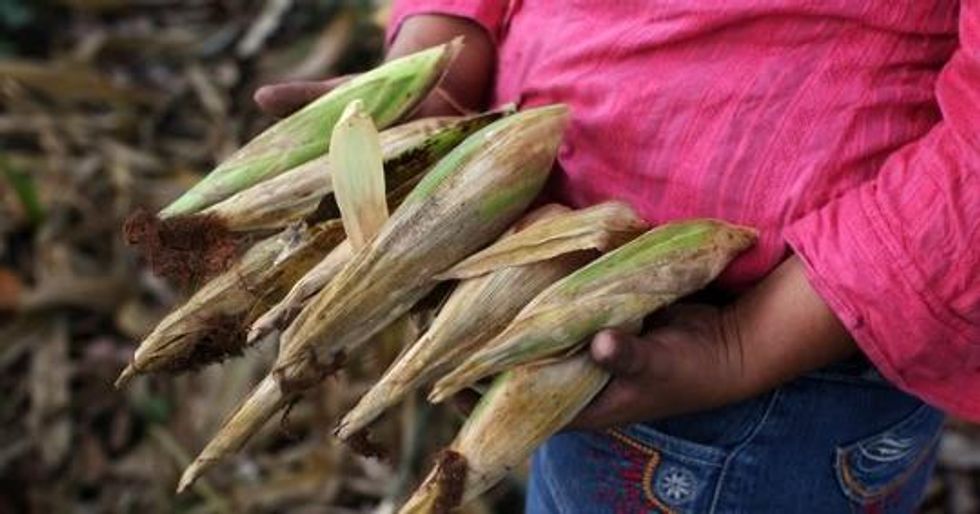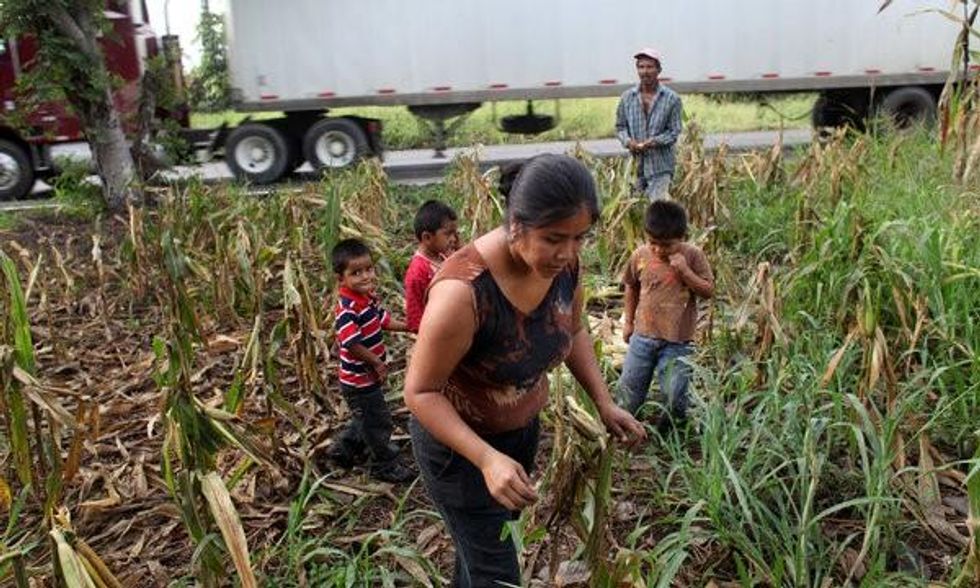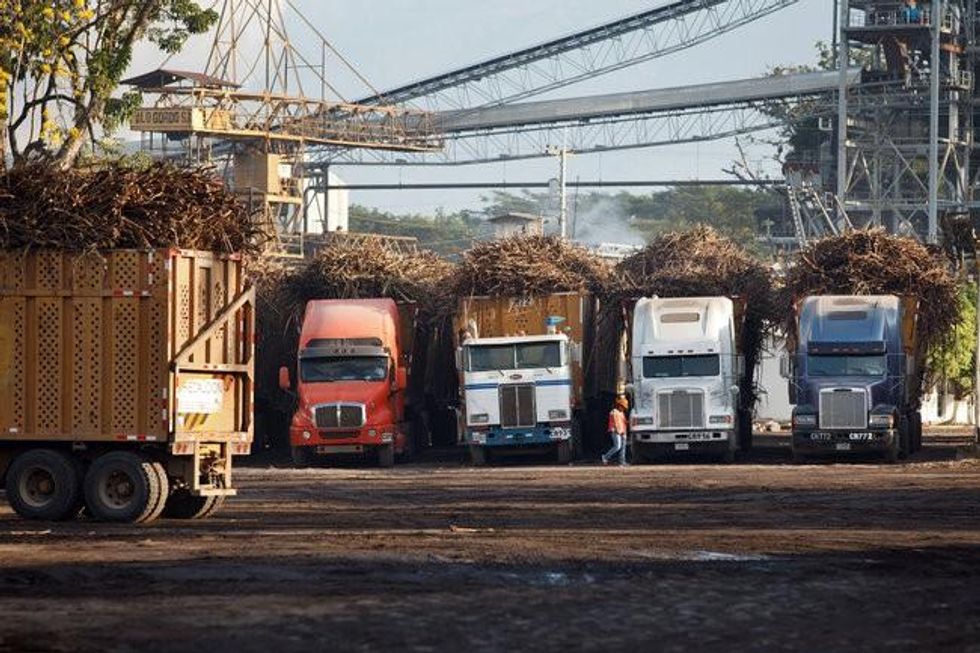Thirst for Biofuels Drives Hunger in Guatemala as Corporate Land Grabs Continue
'They need food. They need land. They can’t eat biofuel, and they don’t drive cars.'

In our global economy, the expansion of the biofuels industry and the American and European fuel standard mandates are driving up food prices worldwide as multi-national corporations grab up land for food-based agriculture in less developed regions of Asia, Africa and Latin America. Space once devoted to growing food for humans is more profitably being used to churn out monocrops like corn and sugarcane to be used as fuel.
And, as Rosenthal writes in her article As Biofuel Demand Grows, So Do Guatemala's Hunger Pangs, "nowhere is that squeeze more obvious than in Guatemala."
Nearly 40 percent of domestic corn crops are used for US biofuel according to Think Progress, and 15 percent of the world's supplies are consequently pushing up the price of corn and other staple foods in Guatemala.
"Just three years ago, one quetzal--about 15 cents--bought eight tortillas; today it buys only four. And eggs have tripled in price because chickens eat corn feed," Rosenthal writes.
That is significant in a country where most families must spend about two thirds of their income on food. According to the report, the price hike is causing widespread starvation in Guatemala. The United Nations estimates that roughly 50 percent of the nation's children are chronically malnourished, the fourth-highest rate in the world.
"The average Guatemalan is now hungrier because of biofuel development," said Katja Winkler, a researcher at Guatemalan nonprofit Idear.
In the countryside, local farmers are being forced to the perimeters of any arable land as Guatemala's largest landowners, for whom "long-term leases with large biofuel companies are more profitable and easier to manage than cattle ranching or renting to subsistence farmers," are selling off to monoculture giants like Pantaleon Sugar Holdings.
An earlier piece by The Guardian reported on the Guatemalan land grab and often-violent eviction of farmers and communities in the rush for land to grow fuel crops.
"These people don't have enough to eat. They need food. They need land. They can't eat biofuel, and they don't drive cars," said Misael Gonzales of C.U.C., a labor union for Guatemala's farmers.
It "is not ethically acceptable," added Guy Gauvreau, head of the United Nations World Food Program in Guatemala.
The New York Times spoke with a number of Guatemalans about their fight to subsist among the skyrocketing prices of food and dwindling farmland; you can watch the videos here.


An Urgent Message From Our Co-Founder
Dear Common Dreams reader, The U.S. is on a fast track to authoritarianism like nothing I've ever seen. Meanwhile, corporate news outlets are utterly capitulating to Trump, twisting their coverage to avoid drawing his ire while lining up to stuff cash in his pockets. That's why I believe that Common Dreams is doing the best and most consequential reporting that we've ever done. Our small but mighty team is a progressive reporting powerhouse, covering the news every day that the corporate media never will. Our mission has always been simple: To inform. To inspire. And to ignite change for the common good. Now here's the key piece that I want all our readers to understand: None of this would be possible without your financial support. That's not just some fundraising cliche. It's the absolute and literal truth. We don't accept corporate advertising and never will. We don't have a paywall because we don't think people should be blocked from critical news based on their ability to pay. Everything we do is funded by the donations of readers like you. Will you donate now to help power the nonprofit, independent reporting of Common Dreams? Thank you for being a vital member of our community. Together, we can keep independent journalism alive when it’s needed most. - Craig Brown, Co-founder |

In our global economy, the expansion of the biofuels industry and the American and European fuel standard mandates are driving up food prices worldwide as multi-national corporations grab up land for food-based agriculture in less developed regions of Asia, Africa and Latin America. Space once devoted to growing food for humans is more profitably being used to churn out monocrops like corn and sugarcane to be used as fuel.
And, as Rosenthal writes in her article As Biofuel Demand Grows, So Do Guatemala's Hunger Pangs, "nowhere is that squeeze more obvious than in Guatemala."
Nearly 40 percent of domestic corn crops are used for US biofuel according to Think Progress, and 15 percent of the world's supplies are consequently pushing up the price of corn and other staple foods in Guatemala.
"Just three years ago, one quetzal--about 15 cents--bought eight tortillas; today it buys only four. And eggs have tripled in price because chickens eat corn feed," Rosenthal writes.
That is significant in a country where most families must spend about two thirds of their income on food. According to the report, the price hike is causing widespread starvation in Guatemala. The United Nations estimates that roughly 50 percent of the nation's children are chronically malnourished, the fourth-highest rate in the world.
"The average Guatemalan is now hungrier because of biofuel development," said Katja Winkler, a researcher at Guatemalan nonprofit Idear.
In the countryside, local farmers are being forced to the perimeters of any arable land as Guatemala's largest landowners, for whom "long-term leases with large biofuel companies are more profitable and easier to manage than cattle ranching or renting to subsistence farmers," are selling off to monoculture giants like Pantaleon Sugar Holdings.
An earlier piece by The Guardian reported on the Guatemalan land grab and often-violent eviction of farmers and communities in the rush for land to grow fuel crops.
"These people don't have enough to eat. They need food. They need land. They can't eat biofuel, and they don't drive cars," said Misael Gonzales of C.U.C., a labor union for Guatemala's farmers.
It "is not ethically acceptable," added Guy Gauvreau, head of the United Nations World Food Program in Guatemala.
The New York Times spoke with a number of Guatemalans about their fight to subsist among the skyrocketing prices of food and dwindling farmland; you can watch the videos here.



In our global economy, the expansion of the biofuels industry and the American and European fuel standard mandates are driving up food prices worldwide as multi-national corporations grab up land for food-based agriculture in less developed regions of Asia, Africa and Latin America. Space once devoted to growing food for humans is more profitably being used to churn out monocrops like corn and sugarcane to be used as fuel.
And, as Rosenthal writes in her article As Biofuel Demand Grows, So Do Guatemala's Hunger Pangs, "nowhere is that squeeze more obvious than in Guatemala."
Nearly 40 percent of domestic corn crops are used for US biofuel according to Think Progress, and 15 percent of the world's supplies are consequently pushing up the price of corn and other staple foods in Guatemala.
"Just three years ago, one quetzal--about 15 cents--bought eight tortillas; today it buys only four. And eggs have tripled in price because chickens eat corn feed," Rosenthal writes.
That is significant in a country where most families must spend about two thirds of their income on food. According to the report, the price hike is causing widespread starvation in Guatemala. The United Nations estimates that roughly 50 percent of the nation's children are chronically malnourished, the fourth-highest rate in the world.
"The average Guatemalan is now hungrier because of biofuel development," said Katja Winkler, a researcher at Guatemalan nonprofit Idear.
In the countryside, local farmers are being forced to the perimeters of any arable land as Guatemala's largest landowners, for whom "long-term leases with large biofuel companies are more profitable and easier to manage than cattle ranching or renting to subsistence farmers," are selling off to monoculture giants like Pantaleon Sugar Holdings.
An earlier piece by The Guardian reported on the Guatemalan land grab and often-violent eviction of farmers and communities in the rush for land to grow fuel crops.
"These people don't have enough to eat. They need food. They need land. They can't eat biofuel, and they don't drive cars," said Misael Gonzales of C.U.C., a labor union for Guatemala's farmers.
It "is not ethically acceptable," added Guy Gauvreau, head of the United Nations World Food Program in Guatemala.
The New York Times spoke with a number of Guatemalans about their fight to subsist among the skyrocketing prices of food and dwindling farmland; you can watch the videos here.



